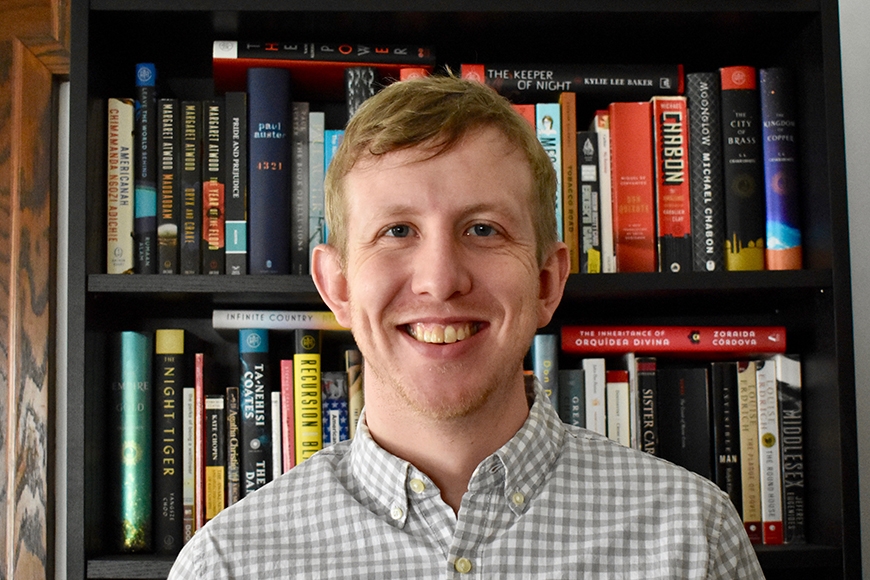PhD Candidate Wins Teaching Award
Congratulations to Chris Bowman, a doctoral candidate in English literature who received one of two Department of English Graduate Student Teaching Awards for 2021-2022! We asked Bowman, who is working on the dissertation “Climate Change of Mind: Revisiting Dust Bowl Narratives in a Time of Climate Catastrophe,” to share some thoughts on teaching and pedagogy.
What do you enjoy most about teaching, and how has being a teacher enhanced your scholarship?
My favorite part of teaching is the process of thinking about something in a new way, which manifests in a variety of ways in different course settings. For example, in Writing Studies and introductory-level English courses, there are often students who might not feel as confident in my class as they do in their major area of study. One of the most fulfilling parts of teaching is seeing confidence grow within even the most reluctant students, as they identify their own strengths in these areas over the course of the semester.
I like to combine my scholarship and teaching as much as possible. When I attend academic conferences, I prioritize attending pedagogical talks, because I typically find that those are more interesting, and they also offer unique assignments or activities that I otherwise wouldn’t encounter. At the International Steinbeck Conference in May 2019 I learned about a digital annotation assignment that one of the presenters had successfully designed and implemented in a course. I approached the presenter and chatted about the parameters of the assignment, and ended up including a similar digital humanities assignment in my version of “Textual Analysis: Methods” that fall. This type of assignment, of course, became even more relevant in the months that followed, so I was especially thankful to have had some experience with digital projects before remote learning became a necessity.
How would you describe your teaching approach and practice? In what ways has your teaching practice had to change to meet the challenges of the past two years?
I think that students get the most out of a course when they feel comfortable expressing themselves, so I make a conscious effort to cultivate a classroom atmosphere that encourages open dialogue. This often means having a number of low-stakes exercises to balance out the bigger projects throughout the semester, and I like to bounce back and forth between informal activities and more intellectually challenging discussions to help keep everyone engaged throughout the class period.
This has been a bit challenging to translate into online teaching modalities, but I still try to keep as many of the “informal” qualities as I can. If I’m recording a video with a mini-lecture, I’ll still throw in a few bad jokes—they just probably get even fewer laughs than they’d get in a classroom. Similarly, although it’s not as easy to have small-group discussions online as it is in-person, I still keep as many of those peer-to-peer activities as possible. Essentially I just try to keep things as “normal” as possible since everything else seems to be changing so rapidly.
Who/what have been models for you in terms of teaching best practices?
One of the first classes I took at UMN was the teaching practicum with Senior Lecturer Eric Daigre, which was incredibly helpful in getting a foundation for teaching undergraduate courses. My advisor, Associate Professor Dan Philippon, has been a strong mentor in teaching, research, and maintaining a healthy work-life balance. I’ve also appreciated the genuine interest that Assistant Professor Rachel Trocchio takes in her students, which I aspire to bring to my own classes.
I’ve been lucky to be a TA for Senior Lecturer Chris Kamerbeek and Associate Professor Brian Goldberg, and both are fantastic models for leading class discussions. Kamerbeek has been particularly helpful in pedagogical discussions, and I’ve absolutely “borrowed” some of his approaches to assignments in my own syllabi.
What have you appreciated most about your studies here at the U?
I’ve felt fortunate to have developed strong relationships with colleagues and to have felt supported in my research and teaching. For example, this past summer a number of us from the English PhD program joined a softball league. We didn’t do particularly well, but I really appreciate the friendships that I’ve made here.
Aside from this, I’ve felt lucky that the English department and Graduate School have supported the archival research for my dissertation, which has had a huge impact on my writing and publications.



